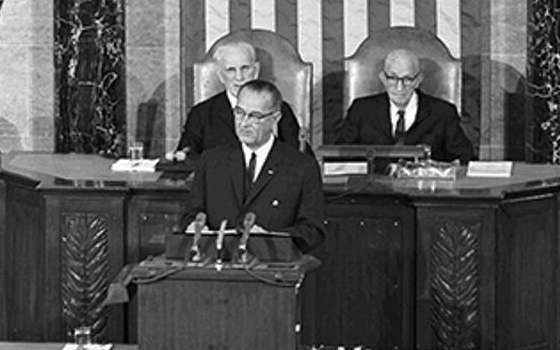- MENU
- HOME
- SEARCH
- WORLD
- MAIN
- AFRICA
- ASIA
- BALKANS
- EUROPE
- LATIN AMERICA
- MIDDLE EAST
- United Kingdom
- United States
- Argentina
- Australia
- Austria
- Benelux
- Brazil
- Canada
- China
- France
- Germany
- Greece
- Hungary
- India
- Indonesia
- Ireland
- Israel
- Italy
- Japan
- Korea
- Mexico
- New Zealand
- Pakistan
- Philippines
- Poland
- Russia
- South Africa
- Spain
- Taiwan
- Turkey
- USA
- BUSINESS
- WEALTH
- STOCKS
- TECH
- HEALTH
- LIFESTYLE
- ENTERTAINMENT
- SPORTS
- RSS
- iHaveNet.com

by Cal Thomas
In his State of the Union address on Jan. 8, 1964, President Lyndon Johnson declared a "war on poverty." Today, with roughly the same number of people below the poverty level as in 1964 and with many addicted to government "benefits," robbing them of a work ethic, it is clear that the poor have mostly lost the war.
In 1964, the poverty rate was about 19 percent. Census data from 2010 indicates that 15.1 percent are in poverty within a much larger population.
The lack of government programs did not cause poverty, and spending vast sums of money has not eliminated it.
A policy analysis by the
As Robert Rector and Jennifer Marshall have written for
Johnson sounded conservative when he said, "(We) want to offer the forgotten fifth of our people opportunity and not doles."
Unfortunately, the war on poverty neglected a key component: human nature. Substantial numbers of people came to rely on government benefits and thus lost any sense of personal responsibility. Teenage girls knew they could get a check from the government if they had babies and so they had them, often more than one. The law discouraged fathers from living with, much less marrying, the mothers of their children and so legions of "single mothers" became the norm, and the lack of male leadership in the home contributed to additional cycles of poverty, addicting new generations to government.
When President Clinton signed the welfare reform bill in 1996, liberals screamed that people would starve in the streets. They didn't. Many got jobs when they knew the checks would cease.
Over time, government enacted rules to prevent churches and faith-based groups from sharing their faith if they wanted to receive federal grants, thus removing the reason for their success. These groups, which once were at the center of fighting poverty by offering a transformed life and consequently a change in attitude, retreated to the sidelines.
In public schools, values that once were taught were removed because of lawsuits and the fear of lawsuits, creating a "naked public square" devoid of concepts such as right and wrong, with everyone left to figure it out on their own.
There are two ways to measure poverty. One is the way the
One condition for maintaining tax-exempt status should be for these faith-based institutions to help people get off government assistance and find jobs, becoming self-sufficient. If people need transitional money for daycare or transportation, it can be provided, either temporarily by government or by the thousands of churches, synagogues and other faith-based groups.
There is no undiscovered truth about the cure for most poverty: Stay in school; get married before having children and stay married; work hard, save and invest.
The "war on poverty" can be won, but it must be fought with different weapons, not the ones that have failed for the last half-century.
Receive our political analysis by email by subscribing here
AMERICAN POLITICS
WORLD | AFRICA | ASIA | EUROPE | LATIN AMERICA | MIDDLE EAST | UNITED STATES | ECONOMICS | EDUCATION | ENVIRONMENT | FOREIGN POLICY | POLITICS
Article: Copyright ©, Tribune Content Agency.
The War on Poverty at 50